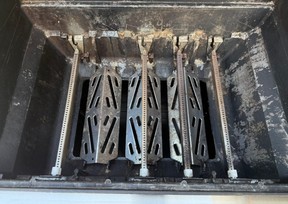How to properly clean a grill
Good news — there is no need for chemicals

Article content
Reviews and recommendations are unbiased and products are independently selected. Postmedia may earn an affiliate commission from purchases made through links on this page.
Every few months (and at least once a year), you should deep clean your grill. While you do not necessarily need to have it sparkling inside out, it is a good idea to remove grease and carbon build-up that can affect performance and, in some cases, taste.
Recommended Videos
I have tried many products, using different techniques on various grills. There are many ways to properly clean a grill, but here is what I’ve found works best.
How to clean a barbecue
Prepare your grill
Move your grill away from a patio or any surface you do not want to get messy before deep cleaning. Even if you don’t hose everything down, you will likely leave some mess behind. Be mindful of where the water drains, as it may leave a trail of soot.

Pro tip #1: Consider burning off your grill after your last cook
You might want to perform a burn-off after your last cook before a deep clean. This burns away food residues and makes it easier to scrape the surfaces. For a burn-off, I crank my gas grill to high heat and wait 15 to 20 minutes. For charcoal grills, add coals if needed and open all vents after cooking. If your gas grill is particularly dirty or has not been cleaned recently, skip this step to avoid a grease fire.
On the day of the deep clean, when everything is cold, put on rubber gloves (the RINNING from IKEA are my go-to, but any dishwashing glove will do). Give a quick scrub with a brush or scraper to the grates and any removable parts inside the cookbox, such as Flavorizer bars, and place them outside the grill. Remove anything in the lower compartment, including the propane tank.
Pro tip #2: Buy a high-quality brush
Every year, people end up in the emergency room because metal bristles from grill brushes detach and end up in food. Safer alternatives include nylon brushes and bristle-free brushes. If you buy a metal wire brush (let’s face it, they clean better), ensure it meets CSA standard Z630, which outlines performance, testing and marking requirements for barbecue grill brushes with metal bristles. I use the Weber Grill Brush – 18 inches three-sided. It could be sturdier (you won’t be able to put all your strength into it), but it cleans extremely well. Of course, always inspect your grates for loose bristles after use and change your brush regularly.
Clean the inside of the grill
Once everything is removed, scrape the grill surfaces with a scraper.
A plastic scraper can be used in a cold grill. Some user manuals suggest using a grill brush, but a scraper does a better job. A steel scraper (like a painter’s tool) risks scratching your grill. While not an issue on every cookbox, a plastic or resin scraper (like The Skrapr) does an adequate job without that risk. Your grill may have come with one (mine did). Otherwise, any small plastic putty knife will suffice.
Pro tip #3: A wet-dry vacuum can be your friend
A wet-dry vacuum is excellent for removing debris from the cookbox and cleaning the lower compartment. It is also useful for removing cold ashes from Kamado-style grills. I use the DeWALT 20V Cordless/Corded Wet-Dry Vacuum. It’s not the most powerful, but the small size is convenient, and it’s easy to clean afterward.

After scraping, you can spray the inside of your grill with a cleaning product, then wipe with a wet cloth. Unfortunately, I’ve tested many products, and nothing natural truly satisfied me. I usually skip this step unless the surface feels sticky, in which case I use warm, soapy water.
For an immaculate cookbox, chemical products like Easy Off BBQ Grill Cleaner aerosol work well, but they are purely for aesthetics and not necessary.
Pro tip #4: Clean your burners
If cleaning a gas grill, consult your manual for burner cleaning instructions. My Weber Genesis requires a brush not previously used for food and specific brushing directions.
Clean grates, Flavorizer bars (the triangular plates over gas grill burners), heat deflectors and accessories separately, including the grease management system.
Pro tip #5: Use dish soap and baking soda
Mix dish soap and baking soda into a paste, apply it to grates and accessories, and soak them for 30 minutes in warm water (use a garbage bag if necessary). Then scrub with warm water, an aluminum foil ball and a lot of elbow grease.
Chemical cleaners can make stainless steel grates look brand new with less effort. But I avoid using chemicals near food. Your grates do not need to look factory-new anyway.
Pro tip #6: Treat cast iron and griddles separately
For cast iron grates or griddle inserts, consider using specialized products. The Quebec skincare brand Caron & Doucet offers an effective cleaning and restoring salt scrub for cast iron and griddles. If your griddle is heavily rusted, leave it for another day, when you can give it your full attention.

Always follow any special cleaning instructions in the manual for your grill or grates.
Pro tip #7: Don’t clean stainless steel grates in the dishwasher
Some brands suggest cleaning stainless steel grates in the dishwasher — don’t. If they are not properly cleaned beforehand, the dishwasher will not help and may even get clogged. And if they are already clean, using the dishwasher is unnecessary.
Clean the exterior and under the grill
Use household cleaning products for the grill exterior and lower compartment.
Different surfaces require different cleaners. Avoid harsh chemicals on stainless steel. I found that Weiman Stainless Steel Cleanerworks well. For a 100 per cent natural option, the Caron & Doucet Stainless Steel Polishis good for daily maintenance, but keep in mind that it is less effective on tough stains.
Pro tip #8: Wipe stainless steel in the direction of the grain
If your grill is stainless steel, use a microfiber cloth, wiping in the grain’s direction. I did not do it once and regretted it.
For glazed ceramic grills like the Kamado Joe, use warm, soapy water and a microfiber cloth or an all-purpose cleaner, such as Simple Green. For a Canadian option, consider the Unscented Company All-Purpose Cleaner Spray.

Put everything back in the grill and reconnect the gas line or propane tank following the manual’s instructions. Start the grill on high heat for 20 minutes to burn off any remaining cleaning product residue.
Keep your grill clean

This is the most important step. Regular maintenance simplifies deep cleaning next time.
Pro tip #9: Clean grates before and after cooking
After cooking, leave the grill on for a few minutes, then brush off any residue. If your brush cannot be used on hot grates, wait for them to cool. Also, brush your grates before your next cook.
If cooking was messy (sauced ribs, I’m looking at you), consider flipping the grates, heating them until hot and brushing them again. Make sure to clean your grease management system if you have one.
Now, about oiling the grates: some authors say you need to oil them after each cook, some say before, and some say you do not need to oil them at all. I find that if you cook on stainless steel grates that are hot enough, you generally do not need oil to prevent food from sticking, unless you’re cooking something delicate. However, it is a good idea to oil rust-prone grates (like cast iron) with a paper towel after cooking to prevent oxidation.

Pro tip #10: Don’t wait too long for your next deep clean
Deep cleaning your grill a few times per grilling season is easier than doing it just once a year, especially if you use it often.
Cover your grill when it is not in use, and store rust-prone components like griddle inserts indoors if you will not be using them for a while.
Shopping Essentials, a category written by research-obsessed shopping fanatics, is now on Canoe.com. Explore in-depth product reviews, expert recommendations and exciting collaborations — plus get behind-the-scenes info on your favourite brands and trending products — learn more here or sign up for our newsletter
Looking for savings? Look no further than our coupons page for discounts on your favourite brands.











Postmedia is committed to maintaining a lively but civil forum for discussion. Please keep comments relevant and respectful. Comments may take up to an hour to appear on the site. You will receive an email if there is a reply to your comment, an update to a thread you follow or if a user you follow comments. Visit our Community Guidelines for more information.